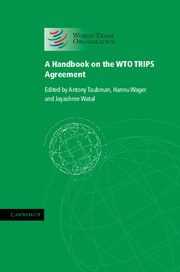Book contents
- Frontmatter
- Contents
- Figures
- Boxes
- Tables
- Preface
- Acknowledgements
- Acronyms and abbreviations
- I Introduction to the TRIPS Agreement
- II Copyright and related rights
- III Trademarks
- IV Geographical indications
- V Patents
- VI Industrial designs, layout-designs of integrated circuits, undisclosed information, anti-competitive practices
- VII Enforcement
- VIII Dispute prevention and settlement
- IX TRIPS and Public Health
- X Current TRIPS issues
- Appendix 1 Guide to TRIPS notifications
- Appendix 2 Guide to TRIPS documents
- Annexes TRIPS Handbook
- Index
Preface
Published online by Cambridge University Press: 05 May 2012
- Frontmatter
- Contents
- Figures
- Boxes
- Tables
- Preface
- Acknowledgements
- Acronyms and abbreviations
- I Introduction to the TRIPS Agreement
- II Copyright and related rights
- III Trademarks
- IV Geographical indications
- V Patents
- VI Industrial designs, layout-designs of integrated circuits, undisclosed information, anti-competitive practices
- VII Enforcement
- VIII Dispute prevention and settlement
- IX TRIPS and Public Health
- X Current TRIPS issues
- Appendix 1 Guide to TRIPS notifications
- Appendix 2 Guide to TRIPS documents
- Annexes TRIPS Handbook
- Index
Summary
Preface
At the heart of the World Trade Organization (WTO), as an international organization, is a set of rules that regulate trade between nations: a body of agreements which have been negotiated and signed by governments of the majority of the world's trading nations, with the aim of promoting transparency, predictability and non-discrimination in trading relations. These agreements, covering trade in goods, trade in services and trade-related aspects of intellectual property rights, help to define and inform the multiple roles of the WTO, in administering the trade agreements, providing a forum for trade negotiations, handling trade disputes, monitoring national trade policies, providing technical assistance and capacity building for developing countries, and cooperating with other international organizations. Understanding these agreements and their practical, policy and legal contexts therefore provides significant insights into the WTO as an institution, its activities and international role, its partnerships with other organizations, and the way in which WTO Member governments identify and pursue their national interests through this intergovernmental forum.
When, in 1994, at the end of the Uruguay Round of trade negotiations, governments settled on the cluster of agreements that created and defined the WTO, the Agreement on Trade-Related Aspects of Intellectual Property Rights, or the TRIPS Agreement, was part of the package. The TRIPS Agreement was not negotiated as a stand-alone treaty, and did not enter into legal force on its own, but is one of the multilateral trade agreements (MTAs) that are integral to the overarching Marrakesh Agreement Establishing the World Trade Organization. This status means that when the TRIPS Agreement entered into force in 1995, it was as part of a composite set of trade agreements that are together binding on countries that choose to join the WTO as Members. The WTO Agreement also made disputes between Members about trade and intellectual property subject to the same dispute settlement mechanism as is used for a wide range of trade issues. But the TRIPS Agreement also incorporated significant elements of the established multilateral intellectual property agreements administered by the UN specialized agency for intellectual property, the World Intellectual Property Organization (WIPO). Hence the TRIPS Agreement has a dual character – an important element of international trade law, it also draws heavily on, and builds upon, the established heritage of international intellectual property (IP) law.
- Type
- Chapter
- Information
- A Handbook on the WTO TRIPS Agreement , pp. xix - xxiPublisher: Cambridge University PressPrint publication year: 2012



